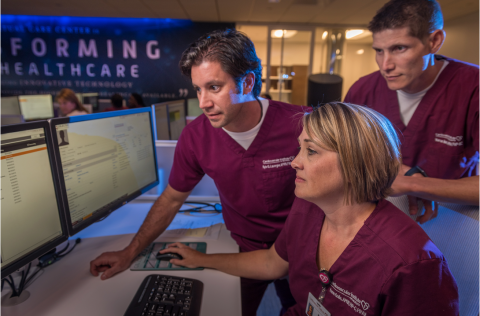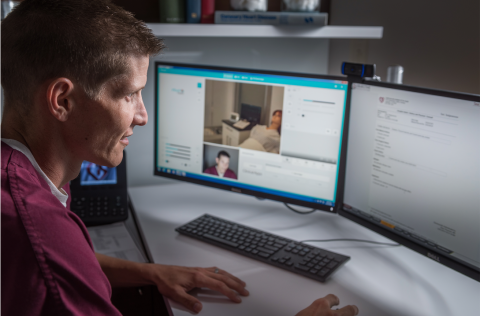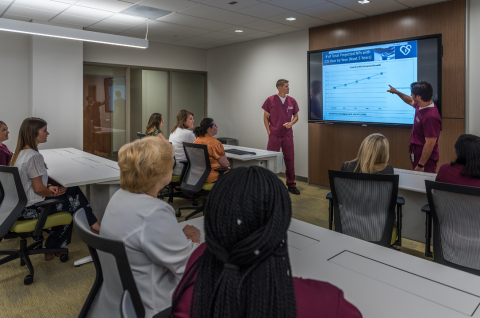Caring for cardiovascular patients requires a very specific skill set. It can take up to six months to equip nurse practitioners in the highly technical, in-demand field, says Jude Hebert, executive vice president of nursing services for Cardiovascular Institute of the South.
“There’s a lot of demand and a lot of nurse practitioners just don’t have a foundation where they can start right away and be productive. It takes a long time to train them,” he says. “The dilemma from an educational standpoint is there’s no program that specifically focuses on cardiovascular medicine.”

The University of Louisiana at Lafayette’s online Graduate Certificate in Cardiovascular Nursing is now preparing nurse practitioners for those roles so they’re able to hit the ground running.
Because of the immense need to provide this high-level training to nurses in cardiovascular medicine, Cardiovascular Institute of the South (CIS) has invested in the program by providing facilities, preceptors, and scholarships for initial cohorts.
Hebert says education is a priority as CIS expands beyond the 18 markets it currently serves.
“CIS is open to training students, and we’ve always been open to bringing people into our organization and training them for the workforce not only to benefit ourselves but also the field of cardiovascular medicine,” Hebert says.
Specialized Education
In order to develop cardiac nursing skills, students enrolled in UL Lafayette's graduate certificate program take three courses over three accelerated terms, earning their graduate certificate in only six months.
The program is open to nurses who have already earned a graduate degree.
Through the online courses, students gain an overview of chronic and acute cardiovascular disorders for adults as well as children and special populations, advanced diagnostic and management techniques, EKG interpretation, and cardiac monitoring — all across clinical settings, including inpatient, outpatient, and telemedicine, using cutting-edge monitoring, robotics, and telecardiology technology.
“Cardiovascular disease is very prominent in the South,” says assistant professor Dr. Deedra Harrington. “If a family nurse practitioner wants to work in the cardio arena, they can gain the specialized background knowledge they did not acquire through their NP education.”
“They learn management of acute and chronic disease processes no matter where they see individuals in the community.”
Long-Distance Health Care
One of the ways CIS and health care delivery at large is evolving is through the use of telemedicine. This technology has significant implications for costs and outcomes among rural patients.
Traditionally, Hebert says, a patient arriving at a rural emergency room for cardiovascular care would automatically be transferred to another facility, which increases costs and may not be medically necessary.
“Take a hospital like Lady of the Sea Hospital in Galliano, Louisiana, which is about 30 miles from the coast and has limited resources — we actually take calls and provide cardiovascular services to the hospital remotely,” Hebert says.
“We’re available to consult with emergency room physicians to evaluate and give recommendations on what should happen with the patient. About 75 percent of the time, those patients are able to stay in that facility because all that is needed is a cardiovascular opinion.”
Currently, CIS has remote operations in eight different locations in Louisiana and is expanding to rural Texas and Mississippi.
 “We have nurse practitioners that are available in the virtual care center 24 hours a day, 365 days a year, who are receiving information from outside facilities on our own patients and are collaborating with cardiologists to make decisions on those patients, especially after hours,” he says.
“We have nurse practitioners that are available in the virtual care center 24 hours a day, 365 days a year, who are receiving information from outside facilities on our own patients and are collaborating with cardiologists to make decisions on those patients, especially after hours,” he says.
UL Lafayette online Master of Science in Nursing - Family Nurse Practitioner graduate Marcus Montet is among those nurse practitioners at CIS.
On any given day, Montet says he may provide care for patients across Louisiana through telemedicine consults in seven different hospitals, perform smoking cessation clinics using virtual technology, field patient calls or physically conduct hospital rounds.
He’s also clinical manager over 22 nurses and nine telemetry technicians.
“A patient may be seeing us for the first time through virtual technology,” he says. “To break the ice and to make the patient feel comfortable is more of a challenge and more of a unique skill than if I was seeing a patient directly in a hospital or clinic.”
Montet says UL Lafayette’s online nursing graduate certificate program gives nurse practitioners the opportunity to separate themselves from the pack while continuing to work.
“Why would a cardiologist hire a family nurse practitioner versus a family nurse practitioner who has a post-graduate certificate in cardiology?” he says.
He says he’s also hopeful the program will ease the transition from primary care to intensive, but rewarding, specialized care.
Proactive, Not Reactive, Care
Technology isn’t just bridging geographic gaps in an emergency, it’s allowing teams of nurse practitioners with CIS to monitor patients in order to manage chronic conditions to take proactive and preventative care measures.
“Our telemetry program allows us to get real-time information on our own patients using wearable devices,” Hebert says. “We can immediately react to those things that could cause a problem with a patient or could cause an emergency room visit.”
Reducing costs for patients and health systems, focusing on preventative care, and reaching vulnerable populations through virtual technology are all part of the changing healthcare landscape, Hebert says.
“Nurse practitioners fit into all of this strategy, but it all starts with training,” he says. “The professionals who complete nursing programs are going to have to have an idea of how their skill sets fit in to that. Online education is one component in making those connections.”